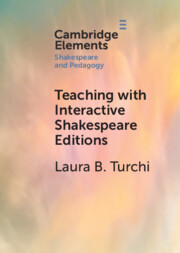References
Bissonnette, J. D., and Glazier, J. (2016). ‘A Counterstory of One’s Own’. Journal of Adolescent & Adult Literacy, [Online] 59(6), 685–94.
Christensen, A., and Turchi, L. B. (2023). ‘Re-editing the Renaissance for an Anti-racist Classroom’. In Wainwright, A. and Chapman, M. (eds.). Race in the European Renaissance: A Classroom Guide. Tempe AZ Arizona Center for Medieval and Renaissance Studies: ACMRS Press, 505-24.
Dakin, M. E. (2012). Reading Shakespeare Film First. Urbana, IL: National Council of Teachers of English.
Dyches, J. (2017). ‘Shaking Off Shakespeare: A White Teacher, Urban Students, and the Mediating Powers of a Canonical Counter-Curriculum’. The Urban Review, [Online] 49(2), 300–25.
Erickson, P. and Hall, K. F. (2016). ‘“A New Scholarly Song”: Rereading Early Modern Race’. Shakespeare Quarterly, 67(1), 1–13.
Estill, L. (2019). ‘Digital Resource Reviews / Comptes Rendus Sur Les Ressources Numeriques Introduction: Special Issue, Digital Shakespeare Texts’. Renaissance and Reformation, 42(3), 167–74.
Hirsch, B., Arneil, S., and Newton, G.. (2017). ‘“Mark the Play”: Electronic Editions of Shakespeare and Video Content’. Scholarly and Research Communication, 8(2). https://doi.org/10.22230/src.2017v8n2a279. Hope, J. (2003). Shakespeare’s Grammar. London: Bloomsbury Arden Shakespeare.
Kennedy, M. M., Pigott, T. D., and Ryan, A. M.. (2019). ‘How We Learn About Teacher Learning’. Review of Research in Education, 43(1), 138–62.
Kidnie, M. J. (2018). ‘The Stratford Festival of Canada: Mental Tricks and Archival Documents in the Age of NTLive’. In Aebischer, P., Greenhaigh, S., and Osborne, L. E. (eds.). Shakespeare and the ‘Live’ Theatre Broadcast Experience. London: Bloomsbury Arden Shakespeare, 133–46.
Lampert, M., and Graziani, F.. (2009). ‘Instructional Activities as a Tool for Teachers’ and Teacher Educators’ Learning’. The Elementary School Journal, 109(5), 491–509.
Lampert, M., Franke, M. L., Kazemi, E., et al. (2013). ‘Keeping It Complex: Using Rehearsals to Support Novice Teacher Learning of Ambitious Teaching’. Journal of Teacher Education, 64(3), 226–243, https://doi.org/10.1177/0022487112473837. Lior, N. (2020). ‘Multimedia Shakespeare Editions: Making Shakespeare Accessible/Making an Accessible Shakespeare’. Research in Drama Education, 25(1), 125–42.
Long, K., and Christel, M. T. (2019). Bring on the Bard: Active Drama Approaches for Shakespeare’s Diverse Student Readers. Urbana, IL: National Council of Teachers of English.
Marcus, L. S. (1996). Unediting the Renaissance: Shakespeare, Marlowe, Milton. London: Routledge.
Massai, S. (2017). ‘Editing Shakespeare in Parts’. Shakespeare Quarterly. 68(1), 56–79.
Neville, S. (2018). ‘Rethinking Scholarly Commentary in the Age of Google: Some Preliminary Meditations on Digital Editions’. Textual Cultures: Text, Contexts, Interpretation, 12(1), 1–26.
Orgel, S. (2007). ‘The Desire and Pursuit of the Whole’. Shakespeare Quarterly, 58(3), 290–310.
Paris, D. (2016). ‘Culturally Sustaining Pedagogy: A Needed Change in Stance, Terminology, and Practice’. Educational Researcher, 41(3), 93–97.
Richmond, G., Bartell, T., Floden, R., and Petchauer, E.. (2017). ‘Core Teaching Practices: Addressing Both Social Justice and Academic Subject Matter’. Journal of Teacher Education, 68(5), 432–34, https://doi.org/10.1177/0022487117732950. Romeo and Juliet, dir F. Zeffirelli, Paramount Pictures 1968.
Royster, F. T. (2011). ‘Comic Terror and Masculine Vulnerability in “Slings and Arrows: Season Three”’. Journal of Narrative Theory, 41(3), 343–61. https://doi.org/10.1353/jnt.2011.0100. Schneier, L. (2021). ‘Give Them the Butterflies’. In Delaney, M. K. and Mayer, S. J. (eds.). In Search of Wonderful Ideas: Critical Explorations in Teacher Education. New York: Teachers College Press, 74–84.
Shaffer, S. (2016). ‘One High School English Teacher: On His Way to a Flipped Classroom’. Journal of Adolescent & Adult Literacy, 59(5), 563–73.
Shepard, L. A. (2021). ‘Ambitious Teaching and Equitable Assessment: A Vision for Prioritizing Learning, Not Testing’. American Educator, 45(3), 28–32.
Simonetta, R. D., and Lo, M.. (2022). ‘The Shakespeare CoLab: A Digital Learning Environment for Shakespeare Studies’. In Henderson, D. E. and Vitale, K. S. (eds.). Shakespeare and Digital Pedagogy: Case Studies and Strategies. London: Bloomsbury Arden Shakespeare, 25–37.
Thomas, E. E., and Stornaiuolo, A.. (2016). ‘Restorying the Self: Bending Toward Textual Justice’. Harvard Educational Review 86(3), 313–38.
Thompson, A., and Turchi, L.. (2016). Teaching Shakespeare with Purpose: A Student-Centred Approach. London: Bloomsbury Arden Shakespeare.
Thompson, J., Windschitl, M., and Braaten, M.. (2013). ‘Developing a Theory of Ambitious Early-Career Teacher Practice’. American Educational Research Journal, 50(3), 574–615, https://doi.org/10.3102/0002831213476334. Turchi, L. B. (2020). ‘Shakespeare e-Books Engage Students and Support Ambitious Teaching’. Research in Drama Education Themed Issue: Teaching Shakespeare: Digital Processes, 25(1), 143–46. https://doi.org/10.1080/13569783.2019.1687290. Windschitl, M., Thompson, J., and Braaten, M. (2011). ‘Ambitious Pedagogy by Novice Teachers: Who Benefits from Tool-supported Collaborative Inquiry into Practice and Why?’ Teachers College Record, 113(7), 1311–60.

 Loading metrics...
Loading metrics...


